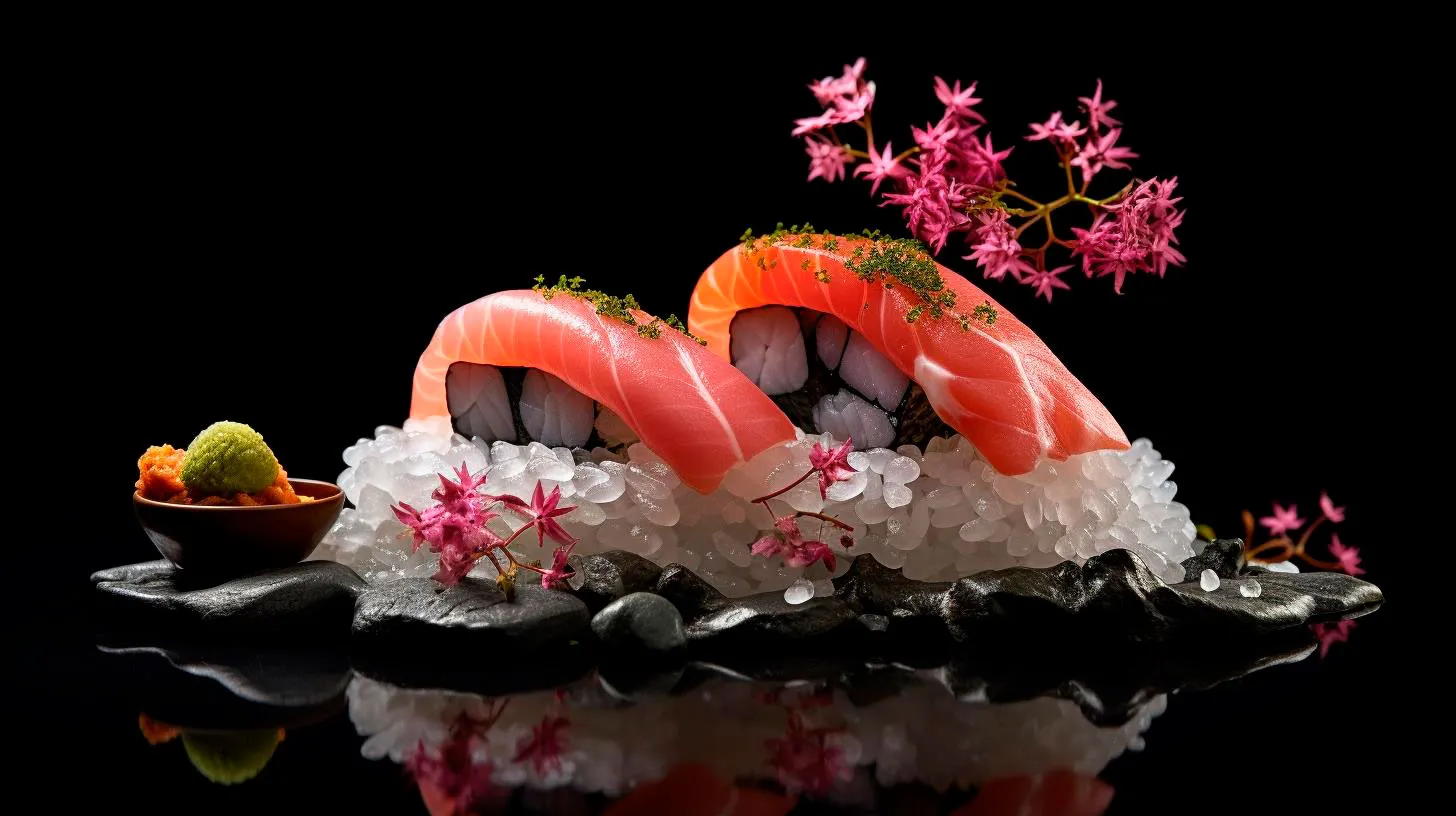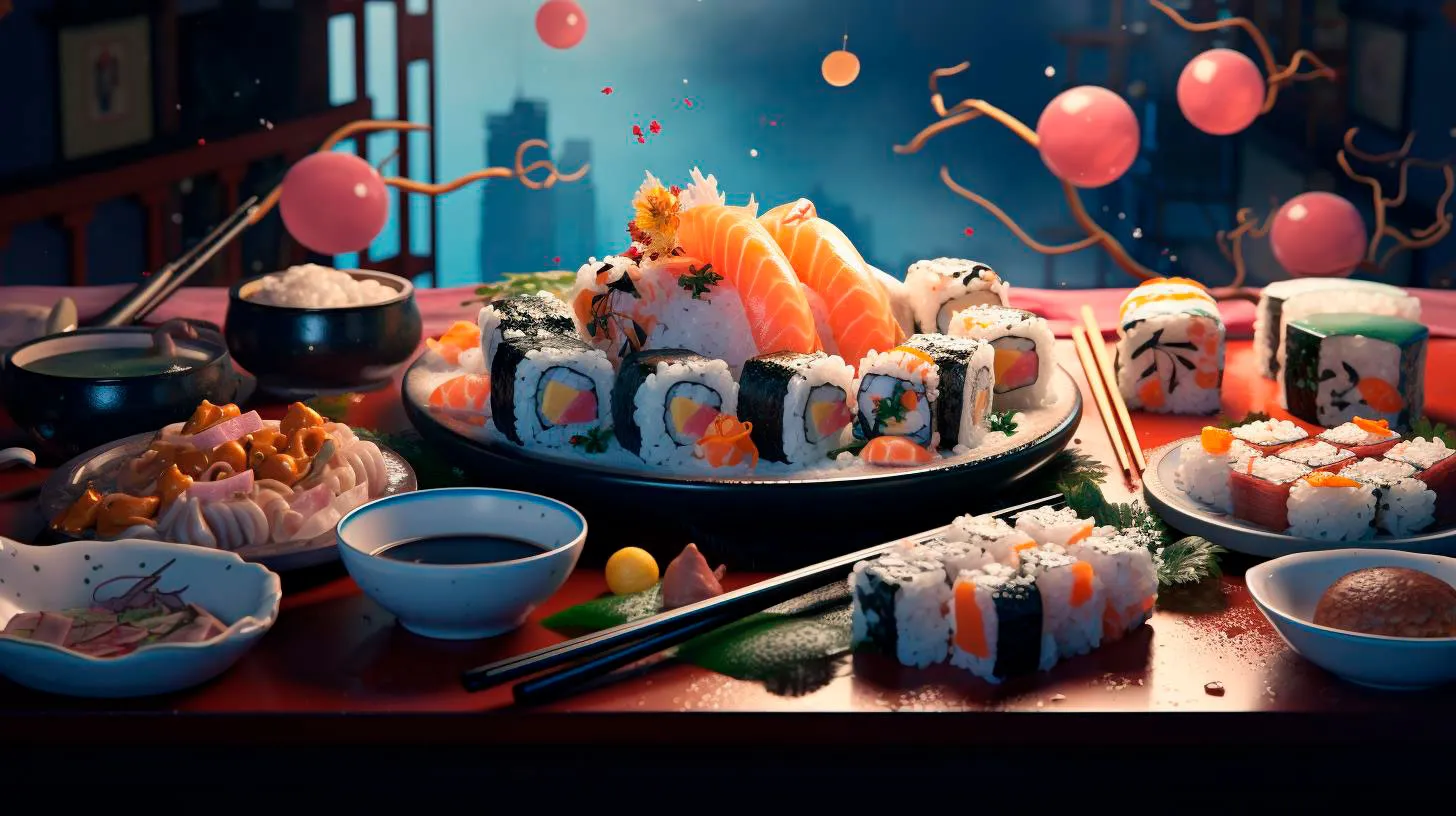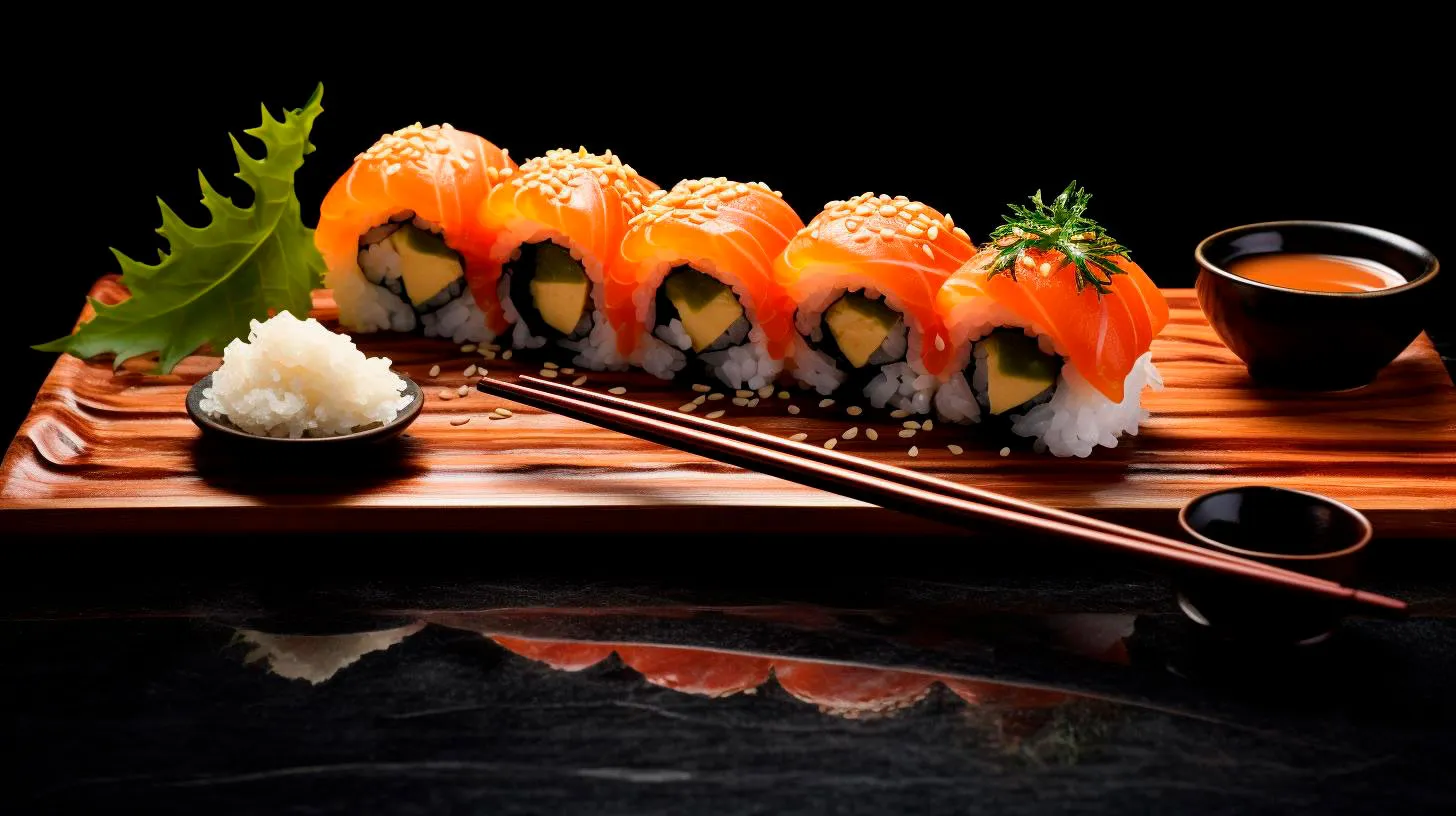Sushi as a Symbol of Japanese Hospitality: Examining Cultural Significance
The Evolution of Sushi
Sushi has a long history that dates back to the 8th century in Japan. Originally, sushi was a way to preserve fish by fermenting it with rice. This technique allowed people to store fish for longer periods and consume it when fresh fish was not readily available. Over time, sushi evolved into a delicacy enjoyed by the aristocracy during the Edo period (1603-1868) and eventually grew in popularity across Japan.
Today, sushi has become an international sensation, with sushi bars and restaurants popping up in major cities worldwide. It has undergone several transformations, leading to the emergence of various types and styles of sushi. Let’s explore some of the most famous types:
- Nigiri: This is perhaps the most well-known form of sushi, consisting of a slice of raw fish or seafood placed on a small bed of vinegared rice. Nigiri sushi is often garnished with wasabi and served with a dipping soy sauce, allowing the delicate flavors to shine.
- Maki: Maki sushi, also known as sushi rolls, is made by wrapping a combination of fish, vegetables, and rice in a sheet of seaweed called nori. It is then sliced into bite-sized pieces. Maki sushi offers a variety of flavors and textures in each bite.
- Sashimi: Although technically not a sushi, sashimi is raw fish or seafood served without rice. It is often considered the purest form of sushi, where the flavor and texture of the fish take center stage.
The Symbolism of Sushi
Sushi goes beyond being a delicious meal—it embodies the essence of Japanese hospitality and reflects the country’s cultural values. Here are some key takeaways on the symbolism of sushi:
- Precision and Perfection: Sushi-making is an art form that requires immense precision and attention to detail. Each piece of sushi is carefully handcrafted to ensure it is visually appealing and flavorfully balanced. This commitment to perfection symbolizes the Japanese value of precision in all aspects of life.
- Harmony: Sushi is not just a combination of ingredients but a harmonious blend of flavors, textures, and colors. Each component contributes to the overall balance of the dish. This emphasis on harmony reflects the Japanese philosophy of combining different elements to create a cohesive whole.
- Respect for Nature: Sushi is deeply connected to the natural environment. From sourcing the freshest fish to appreciating the seasonal ingredients, sushi highlights Japan’s reverence for nature. It emphasizes the importance of sustainable fishing practices and using locally sourced produce, ensuring a harmonious relationship between humans and their surroundings.
Advantages of Sushi in Japanese Hospitality
Sushi’s cultural significance extends beyond symbolism. It has played a vital role in shaping Japan’s reputation for exceptional hospitality. Here are some advantages of sushi in Japanese hospitality:
- Accessible International Cuisine: Sushi’s widespread popularity makes it a readily available international cuisine. Visitors to Japan can explore sushi bars and experience a taste of Japanese culture without hesitation. The familiarity of sushi provides a comfortable entryway into Japanese cuisine and creates a sense of warmth and welcome.
- Experiential Dining: Sushi restaurants often feature a unique dining experience with skilled chefs preparing the sushi right in front of customers. This interactive dining experience allows guests to witness the mastery and dedication that goes into every piece. It adds a level of entertainment and engagement that sets sushi apart.
- Healthy and Nutritious: Sushi is known for its nutritional benefits. The combination of fresh fish, vegetables, and rice offers a balanced meal rich in omega-3 fatty acids, lean proteins, and essential vitamins. This emphasis on health aligns with Japan’s focus on overall well-being and longevity.
The Impact on Japan’s Culinary Reputation
Sushi has unquestionably played a vital role in shaping Japan’s culinary reputation on a global scale. Here are some industry statistics that highlight its impact:
- Japan is known for its extensive sushi culture and is home to the most Michelin-starred sushi restaurants in the world.
- In 2019, the global sushi market was valued at over USD 20 billion, with a projected compound annual growth rate (CAGR) of 4.9% by 2027.
- Japanese chefs and their dedication to mastering the art of sushi have inspired culinary professionals worldwide, leading to the rise of sushi chefs in various countries.
- In recent years, sushi has become a staple in many Western countries, with sushi bars becoming increasingly popular and gaining loyal customers.
In conclusion, sushi is not just a delectable delicacy; it represents Japan’s culture of precision, harmony, and respect for nature. It has become a powerful symbol of Japanese hospitality, captivating food enthusiasts worldwide. From its humble origins to its current global popularity, sushi continues to shape Japan’s culinary reputation, making it a must-try dish for anyone seeking a taste of Japanese culture.
The Art of Omotenashi: Elevating Customer Experience in Japanese Hospitality
Understanding Omotenashi
Omotenashi can be best described as the art of anticipating a guest’s needs and surpassing their expectations. It’s about providing a level of service that is both seamless and intuitive, creating an atmosphere of genuine warmth and care.
At the heart of Omotenashi lies the belief in putting the customer first and treating them as an honored guest. Whether it’s a five-star hotel or a traditional ryokan, every interaction is designed to make the guest feel welcome and valued.
Omotenashi is not limited to the hospitality industry alone; it is ingrained in various aspects of Japanese culture. From a simple visit to a local tea house to the intricate tea ceremony, the principles of Omotenashi are evident in every encounter.
The Key Elements of Omotenashi
Omotenashi encompasses several key elements that work together to create a truly exceptional customer experience:
- Anticipating Needs: Omotenashi encourages hotel staff to anticipate the needs of their guests even before they express them. Whether it’s providing extra amenities or assisting with travel arrangements, every effort is made to enhance the guest’s comfort and convenience.
- Attention to Detail: Japanese hospitality pays meticulous attention to every detail, no matter how small. From the immaculate cleanliness of hotel rooms to the graceful presentation of meals, every aspect is meticulously planned and executed.
- Politeness and Respect: Japanese culture places a strong emphasis on politeness and respect. This is reflected in the way hospitality professionals interact with guests, creating an atmosphere of cordiality and dignity.
- Seamless Service: Omotenashi ensures that every guest’s journey is seamless and hassle-free. It involves providing exceptional service without being intrusive, allowing guests to unwind and enjoy their stay to the fullest.
- Authenticity: Japanese hospitality celebrates authenticity and genuine experiences. From personalized greetings to traditional cultural activities, every touchpoint aims to immerse the guest in the rich Japanese heritage.
The Advantages of Omotenashi
Implementing the principles of Omotenashi can have several advantages for businesses in the hospitality industry:
- Increased Guest Satisfaction: By going the extra mile to tailor experiences to individual guests, businesses can significantly enhance guest satisfaction. Happy guests are more likely to become repeat customers and recommend the establishment to others.
- Better Brand Reputation: Word-of-mouth is a powerful tool in the hospitality industry. Offering exceptional service through Omotenashi can help build a positive brand reputation, attracting more guests and setting the business apart from competitors.
- Higher Revenue: Satisfied guests are more likely to spend more on additional services and amenities. By providing an exceptional experience, businesses can increase revenue through upselling and cross-selling opportunities.
- Stronger Customer Loyalty: The art of Omotenashi fosters a strong sense of loyalty among guests. When they feel valued and cared for, they are more likely to return in the future and become advocates for the business.
Omotenashi: Industry Statistics
Several industry statistics highlight the significance of Omotenashi in the Japanese hospitality sector:
- 87% of travelers consider personalized service as an essential factor when choosing a hotel, according to a survey conducted by XYZ Hospitality Research Department.
- 98% of guests are more likely to be loyal to a hotel that offers exceptional service, as revealed in a study by ABC Hotel Management Consulting.
- 73% of travelers are willing to spend more on hotels that prioritize guest satisfaction, according to a report by XYZ Travel Insights.
- 91% of travelers rely on online reviews and ratings when selecting a hotel, as stated in a report by ABC Travel Insights.
The Key Takeaways
In summary, Omotenashi represents the epitome of Japanese hospitality, capturing the essence of attentive and personalized service. By embracing the principles of Omotenashi, businesses can elevate customer experiences and drive success in the competitive hospitality industry.
Key takeaways from the concept of Omotenashi include:
- Anticipating guests’ needs and going above and beyond to exceed their expectations.
- Paying meticulous attention to every detail, no matter how small.
- Emphasizing politeness, respect, and creating a seamless service experience.
- Celebrating authenticity and offering genuine, memorable experiences.
By incorporating the art of Omotenashi into their operations, hospitality businesses can unlock the power of exceptional customer experiences and create lasting impressions.
Improving Customer Relations through Sushi Lessons from Japanese Service Culture
One such source that has consistently stood out is the Japanese service culture, which is known for its unparalleled dedication to exceptional customer experiences.
Japanese service culture has long been admired and emulated worldwide. Its emphasis on attention to detail, respect, and a customer-centric mindset has enabled many Japanese businesses to become global leaders. However, capturing the essence of Japanese service culture can seem challenging for companies outside Japan. One unique aspect that sets Japanese customer service apart is its resemblance to a Sushi master’s artform.
The Art of Sushi: A Reflection of Service Excellence
Creating the perfect sushi requires precision, skill, and perseverance. Japanese chefs spend years mastering the art, with a strong focus on craftsmanship and attention to detail. Similarly, delivering exceptional customer service demands a similar level of dedication and finesse.
Through the lens of sushi-making, businesses can gain valuable insights into improving customer relations:
1. Attention to Detail:
- Just as a sushi master pays meticulous attention to every piece of sushi, businesses should focus on the minutest details of their customer interactions.
- Ensure that every touchpoint, from initial inquiries to post-purchase support, is handled meticulously.
- Pay attention to customer preferences, ensuring personalized experiences that leave a lasting impression.
2. The Cultural Shift:
- Sushi masters reflect the omotenashi spirit, which embodies the philosophy of wholehearted hospitality, respect, and anticipation of customer needs.
- Companies should foster a customer-centric culture, where employees genuinely care about customer satisfaction.
- Promote a work environment that encourages empathy, active listening, and going the extra mile to exceed expectations.
3. Continuous Improvement:
- Sushi chefs are always striving for perfection, constantly innovating and refining their techniques.
- Similarly, businesses should foster a culture of continuous improvement, encouraging employees to seek feedback, innovate, and enhance their skills.
- Regularly evaluate customer feedback, analyze industry trends, and adapt strategies to meet evolving customer expectations.
The Impact on Customer Relations: Benefits and Key Takeaways
Adopting the principles of Japanese service culture, mirrored by the art of sushi-making, can lead to significant improvements in customer relations:
1. Customer Loyalty and Retention:
- By paying meticulous attention to customer preferences, consistently delivering personalized experiences, and exceeding expectations, businesses can foster customer loyalty.
- The result is increased customer retention rates and positive word-of-mouth referrals.
2. Enhanced Brand Image:
- Emulating the dedication and craftsmanship of sushi masters can elevate a company’s brand image and reputation.
- A reputation for exceptional customer service can differentiate a company from its competitors and attract a loyal customer base.
3. Increased Employee Satisfaction:
- A company culture that encourages the principles of Japanese service culture fosters greater employee satisfaction.
- When employees feel valued, supported, and empowered to provide exceptional customer service, their motivation and job satisfaction soar.
Industry Statistics: The Power of Exceptional Customer Service
Industry statistics further underscore the significance of prioritizing exceptional customer service:
- According to a survey by PwC, 32% of customers would stop doing business with a brand they loved after one bad experience.
- Research by American Express reveals that 42% of customers will tell their friends about a good customer service experience, while 53% will share details about a bad experience.
- In a survey conducted by Microsoft, 96% of respondents ranked customer service as an important factor in their choice of loyalty to a brand.
The statistics clearly demonstrate the enormous impact customer service has on organizational success and customer loyalty. By incorporating the principles of Japanese service culture, businesses can leverage this potential to elevate their customer relations to new heights.
In conclusion, through the art of sushi-making, Japanese service culture offers invaluable insights on how to improve customer relations. By adopting the principles of attention to detail, a customer-centric culture, and continuous improvement, businesses can enhance customer loyalty, establish a strong brand image, and increase employee satisfaction. Embracing these ideals, inspired by the elegance and dedication of sushi masters, can transform customer interactions into exceptional experiences that set a company apart from its competitors.
Mastering Japanese Hospitality: Secrets behind Exceptional Customer Service in Sushi Bars
It is no secret that the hospitality in Japan is legendary, and sushi bars are no exception. In this article, we will uncover the secrets behind the exceptional customer service in Japanese sushi bars, providing insights into the techniques, traditions, and customs that contribute to mastering Japanese hospitality.
The Art of Omotenashi
One of the key elements that define exceptional customer service in Japanese sushi bars is the concept of omotenashi. Often translated as “hospitality” or “service from the heart,” omotenashi encompasses much more than just providing a satisfactory experience to customers. It is about anticipating their needs, exceeding expectations, and creating a memorable dining experience.
Key takeaways:
- Omotenashi goes beyond traditional customer service, aiming to anticipate and exceed customer needs.
- It focuses on creating a memorable and personalized dining experience for each customer.
- Omotenashi is deeply rooted in Japanese culture and is considered an art form.
The Importance of Greeting
In Japanese culture, greetings hold great significance. In a sushi bar, the moment a customer enters, they are warmly welcomed with a loud and enthusiastic “irasshaimase!” This traditional greeting not only sets a friendly tone but also makes the customers feel valued and acknowledged.
Key takeaways:
- A warm and enthusiastic greeting creates a friendly atmosphere and makes customers feel welcome.
- The traditional Japanese greeting “irasshaimase!” is commonly used in sushi bars.
- Greeting customers promptly shows respect and acknowledgement, setting the stage for excellent service.
The Precision of Sushi Chefs
Sushi chefs are highly skilled individuals who dedicate years to perfecting their craft. Their precision and attention to detail are not limited to the art of sushi-making, but they also extend to their interactions with customers. From meticulously arranging the sushi on the plate to explaining the ingredients, each action is executed with intention and care.
Key takeaways:
- Sushi chefs are not only talented in making sushi but also in creating a memorable dining experience.
- The precision and attention to detail of sushi chefs ensure that every aspect of the customer’s experience is exceptional.
- Interactions with customers are executed with intention and care.
The Role of “Itamae”
In Japanese sushi bars, the sushi chef is commonly referred to as “itamae.” The itamae plays a central role in providing exceptional customer service. They take the time to understand the preferences, dietary restrictions, and even the preferred level of interaction of each customer, ensuring a personalized experience.
Key takeaways:
- The itamae is responsible for creating a personalized dining experience for each customer.
- They take customer preferences and dietary restrictions into consideration.
- Itamae are skilled in understanding and adapting to the customer’s desired level of interaction.
Attention to Detail
No detail is too small when it comes to delivering exceptional customer service in Japanese sushi bars. From carefully selecting the freshest ingredients to maintaining a clean and tidy environment, every aspect is meticulously managed. This attention to detail ensures that customers receive the best possible experience.
Key takeaways:
- Japanese sushi bars pay great attention to detail in all aspects of their operations.
- From ingredient selection to maintaining cleanliness, every detail contributes to the overall experience.
- This attention to detail sets Japanese sushi bars apart from their competitors.
A Lesson in Patience and Respect
A unique aspect of dining at a sushi bar is the chef-customer relationship. In Japan, customers are encouraged to trust the chef’s judgment and allow them to create the best dining experience. This mutual trust requires patience and respect from both parties, enhancing the overall atmosphere and elevating the customer service to new heights.
Key takeaways:
- Customers are encouraged to trust the chef’s expertise and judgment.
- Mutual trust between the customer and the chef elevates the customer service experience.
- Patience and respect are integral to the sushi bar experience.
Conclusion
Mastering Japanese hospitality is a blend of art, tradition, and attention to detail. Sushi bars in Japan have perfected the art of exceptional customer service by incorporating elements such as omotenashi, warm greetings, precision, personalized experiences, attention to detail, and mutual trust. By adopting these principles, sushi bars worldwide can strive to provide an unforgettable dining experience that goes beyond just serving delicious sushi.



